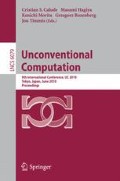Abstract
Postselection for quantum computing devices was introduced by S.Aaronson[2] as an excitingly efficient tool to solve long standing problems of computational complexity related to classical computing devices only. This was a surprising usage of notions of quantum computation. We introduce Aaronson’s type postselection in quantum finite automata.
There are several nonequivalent definitions of quantum finite automata. Nearly all of them recognize only regular languages but not all regular languages. We prove that PALINDROMES can be recognized by MM-quantum finite automata with postselection. At first we prove by a direct construction that the complement of this language can be recognized this way. This result distinguishes quantum automata from probabilistic automata because probabilistic finite automata with non-isolated cut-point 0 can recognize only regular languages but PALINDROMES is not a regular language.
The research was supported by Grant No. 09.1570 from the Latvian Council of Science and by Project 2009/0216/1DP/1.1.2.1.2/09/IPIA/VIA/004 from the European Social Fund.
Access this chapter
Tax calculation will be finalised at checkout
Purchases are for personal use only
Preview
Unable to display preview. Download preview PDF.
References
Aaronson, S.: Lower bounds for local search by quantum arguments. SIAM Journal on Computing 35(4), 805–824 (2004) (See also quant-ph/0307149)
Aaronson, S.: Quantum Computing, Postselection, and Probabilistic Polynomial-Time. Proceedings of the Royal Society A 461(2063), 3473–3482 (2005) (See also quant-ph/0412187)
Ablayev, F.M.: On Comparing Probabilistic and Deterministic Automata Complexity of Languages. In: Kreczmar, A., Mirkowska, G. (eds.) MFCS 1989. LNCS, vol. 379, pp. 599–605. Springer, Heidelberg (1989)
Ablayev, F.M., Freivalds, R.: Why Sometimes Probabilistic Algorithms Can Be More Effective. In: Gruska, J., Rovan, B., Wiedermann, J. (eds.) MFCS 1986. LNCS, vol. 233, pp. 1–14. Springer, Heidelberg (1986)
Aharonov, D., Regev, O.: Lattice problems in NP cap coNP. Journal of the ACM 52(5), 749–765 (2005)
Ambainis, A., Beaudry, M., Golovkins, M., Ķikusts, A., Mercer, M., Therien, D.: Algebraic Results on Quantum Automata. Theory of Computing Systems 39(1), 165–188 (2006)
Ambainis, A., Bonner, R., Freivalds, R., Ķikusts, A.: Probabilities to accept languages by quantum finite automata. In: Asano, T., Imai, H., Lee, D.T., Nakano, S.-i., Tokuyama, T. (eds.) COCOON 1999. LNCS, vol. 1627, pp. 174–183. Springer, Heidelberg (1999) (See also quant-ph/9904066)
Ambainis, A., Freivalds, R.: 1-way quantum finite automata: strengths, weaknesses and generalizations. In: Proc. FOCS 1998, pp. 332–341 (1998) (See also quant-ph/9802062)
Ambainis, A., Ķikusts, A.: Exact results for accepting probabilities of quantum automata. Theoretical Computer Science 295(1-3), 3–25 (2003)
Ambainis, A., Ķikusts, A., Valdats, M.: On the class of languages recognizable by 1-way quantum finite automata. In: Ferreira, A., Reichel, H. (eds.) STACS 2001. LNCS, vol. 2010, pp. 75–86. Springer, Heidelberg (2001)
Ambainis, A., Nayak, A., Ta-Shma, A., Vazirani, U.: Quantum dense coding and quantum finite automata. Journal of ACM 49, 496–511 (2002); Earlier version: STOC 1999 and quant-ph/9804043
Barenco, A., Bennett, C.H., Cleve, R., DiVincenzo, D.P., Margolus, N., Shor, P.W., Sleator, T., Smolin, J., Weinfurter, H.: Elementary gates for quantum computation. Physical Reviews A52, 3457–3467 (1995)
Bernstein, E., Vazirani, U.: Quantum complexity theory. SIAM Journal on Computing 26, 1411–1473 (1997)
Brodsky, A., Pippenger, N.: Characterizations of 1-way quantum finite automata. SIAM Journal on Computing 31(5), 1456–1478 (2002) (See also quant-ph/9903014)
Bukharaev, R.G.: Probabilistic automata. Journal of Mathematical Sciences 13(3), 359–386 (1980)
Freivalds, R. (Freivald, R.V.): Recognition of languages with high probability on different classes of automata. Dolady Akademii Nauk SSSR 239(1), 60–62 (1978) (Russian)
Freivalds, R.: Projections of Languages Recognizable by Probabilistic and Alternating Finite Multitape Automata. Information Processing Letters 13(4/5), 195–198 (1981)
Freivalds, R.: Complexity of Probabilistic Versus Deterministic Automata. In: Barzdins, J., Bjorner, D. (eds.) Baltic Computer Science. LNCS, vol. 502, pp. 565–613. Springer, Heidelberg (1991)
Freivalds, R.: Non-Constructive Methods for Finite Probabilistic Automata. International Journal of Foundations of Computer Science 19(3), 565–580 (2008)
Kerenidis, I., de Wolf, R.: Exponential lower bound for 2-query locally decodable codes via a quantum argument. Journal of Computer and System Sciences 69(3), 395–420 (2004) (See also quant-ph/0208062)
Kondacs, A., Watrous, J.: On the power of quantum finite state automata. In: Proc. FOCS 1997, pp. 66–75 (1997)
Macarie, I.I.: Space-Efficient Deterministic Simulation of Probabilistic Automata. SIAM Journal on Computing 27(2), 448–465 (1998)
Moore, C., Crutchfield, J.: Quantum automata and quantum grammars. Theoretical Computer Science 237, 275–306 (2000) (Also quant-ph/9707031)
Rabin, M.O.: Probabilistic automata. Information and Control 6(3), 230–245 (1963)
Author information
Authors and Affiliations
Editor information
Editors and Affiliations
Rights and permissions
Copyright information
© 2010 Springer-Verlag Berlin Heidelberg
About this paper
Cite this paper
Scegulnaja-Dubrovska, O., Lāce, L., Freivalds, R. (2010). Postselection Finite Quantum Automata. In: Calude, C.S., Hagiya, M., Morita, K., Rozenberg, G., Timmis, J. (eds) Unconventional Computation. UC 2010. Lecture Notes in Computer Science, vol 6079. Springer, Berlin, Heidelberg. https://doi.org/10.1007/978-3-642-13523-1_14
Download citation
DOI: https://doi.org/10.1007/978-3-642-13523-1_14
Publisher Name: Springer, Berlin, Heidelberg
Print ISBN: 978-3-642-13522-4
Online ISBN: 978-3-642-13523-1
eBook Packages: Computer ScienceComputer Science (R0)

